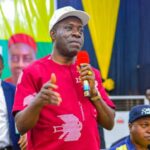Nigeria is a marriage that has always threatened to fail. With all its abundant natural resources and early prospects among Africa’s newly independent states, Nigeria soon came to typify Cassandra Clare’s saying that “Beautiful things are so easily broken by the world”.[i] The one thing that characterised its first decade of independence was ethnic tension, the failed Biafran secession attempt and the ensuing bloody two and a half-year civil war that engulfed the country. Since independence, Nigeria’s major ethnic groups have made it part of their political repertoires to threaten secession whenever things are not politically going their way. So, why has Nigeria been so susceptible to secessionist agitations?
Nigeria’s secessionist agitations are partly primordial in nature for the fact that they look to establish more ethnically homogenous states. They are packed with emotional aspects that are hard to rationalise. However, this is not surprising given that secessionist movements are often formed on the basis of a common history, religion, race, tribe and ethnicity. For this reason, secessionist agitation is usually persistent and hard to completely die out. Secessionist agitations that are not based on primordial relationships are rare but relatively easier to quell. A good example of this is the US North-South divide that led to the American civil war.
- PODCAST: What to do with Nigeria’s 10 million out of school children
- NANS wants bandits declared as terrorist
The recent reemergence of secessionist agitations in Nigeria are more ethnic than anything else. According to Horowitz, ethnicity-based secessionism is a special species of ethnic conflict. Undoubtedly, Nigeria’s ethnic, religious and cultural heterogeneity is one of the many reasons why the country is susceptible to secessionist movements. Nigeria’s secessionist agitations are, by their very nature, a reflection of ethnic disharmony and conflict, particularly among the country’s three main ethnic groups. However, why some elements from the country’s South East and South West regions find it currently convenient to resume their secessionist agitations can be aggregated to a number of factors.
One of the reasons is the current power relationships among the three main regions of the country. Nigerians are yet to learn how to coexist with each other without mutual hostility, finger-pointing and distrust. This owes to the nonconsensual unity that the British colonial rulers cooked up in the early years of the 20th century. Whenever a section of the country is perceived by others to be dominating at the centre, the latter threaten withdrawal or resort to malicious campaigns and other forms of blackmail. Since Nigeria’s independence, secession acts like the proverbial multiple-head snake that you behead it and the mutilated head or another pops out ad infinitum. Nigerians have not yet worked out an effective mechanism for power sharing among its main ethnic and religious groups.
Nigeria’s political/institutional structure, which continues to concentrate power at the centre is another factor that promotes secession. A head of state from one section of the country means perceived marginalisation and fear of domination in the others. That has been the way Nigerians interpret power relations and has been the discourse since independence. Nigeria should devise a system that reduces the concentration of power at the centre and more to the lower levels. The notion of restructuring the country is, therefore, not only desirable but necessary if Nigeria is to continue to remain as one nation. Restructuring itself has been a notion we like to abuse. Like other political and economic interests, it unsurprisingly means different things to different sections of the country. Nigerians therefore, have to come to a consensus on what restructuring itself means before using it to salvage what remains of the country.
More alarming is the state weakness that Nigeria has been exhibiting. It gives the impression that the Nigerian state is overwhelmed by the goings within its territorial boundaries. There is virtually not a single aspect of governance in which Nigeria appears to be doing even moderately well. One needs not be reminded of the dwindling state of the country’s security, the shambled state of its economy, weak institutions and bad policies. Affairs in the country continue to seem perpetually and eternally out of state control.
In addition to the frightening state of insecurity in the country, an increasing number of the masses have been rapidly falling into the deep well of destitution. The southern part of the country perceived economic deprivation in favour of the north where the incumbent president comes from. Ironically, many people in the north also perceive that the president is serving the interests of the other regions of the country despite having hailed from the region and their overwhelming support for him. Like state weakness, economic depression and perceived economic deprivation are strongly linked to secessionist agitations.
Of all the factors contributing to secessionist agitations in Nigeria, the growing number of marginalised masses is perhaps the most dangerous. The vast majority of these masses are youths as Nigeria’s current population median age is estimated to be around 18 years. The lives of these large number of youths are increasingly becoming less affected by government, whereas elites and politicians have been corruptly amassing wealth at the expense of the impoverished masses. Consequently, a large number of masses are unemployed, underemployed while the white-collar workers are grossly underpaid. The impoverished middleclass theoretically and logically forms the social basis of secession.
Less economic dependence on the federal government also makes regions more susceptible to secessionist agitations. Whether the currently ongoing East and West agitations take into consideration their respective regions economic dependence (or lack of it thereof) in relation to the federal government in their rational choice to secede requires some proof. However, we are almost certain that the masses that support these agitations must believe that their individual and collective wellbeing will be better off if their regions secede. They must also believe that they stand to gain little or nothing if the country remains united.
These agitations are becoming increasingly appealing because of the factors outlined above. The federal government has to be careful and strategic in its response to the ongoing secessionist agitations. Its current repressive response may appear to temporarily quell the agitations but it will hardly end them in the long term. State repression against secessionist movements begets both local and international sympathy for the latter.
If the current Nigerian government has a genuine interest in sustaining project Nigeria, it should address the root causes of the secessionist agitations rather than trying to paper over the symptoms. The masses need to be affected more by the government through more masses-oriented policies that testify to the government’s commitment to their wellbeing. Even more urgent is the need to get on top of the various security challenges currently confronting the country. The longer these security challenges linger, the more Nigerian government fosters the perception of weakness in the minds of the agitators and the need to break away from the unity. Also, when the state is weak the international community dares to lend their support to secessionist voices. As the saying goes, ‘Do not play dead with vultures.’
Abubakar A. Usman (PhD) works with Institute of Malaysian & International Studies (IKMAS), National University Malaysia (UKM)

 Join Daily Trust WhatsApp Community For Quick Access To News and Happenings Around You.
Join Daily Trust WhatsApp Community For Quick Access To News and Happenings Around You.

